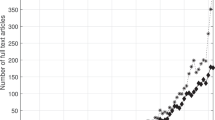Abstract
This paper reviews the ways in which psychology has influenced the pastoral counseling movement, focuses, upon how the role and function of the pastoral counselor have lost their unique identity, and offers the construct of a moral context as a means for rediscovering, identifying, reviving, and strengthening the pastoral counselor's professional and spiritual selfimage.
Similar content being viewed by others
References
The AAPC is currently seeking acceptance as a service provider from CHAMPUS, a United States government employee insurance company.
“Can Pastoral Counselors Survive?” Theme of the Fall Conference of the Central Region of the American Association of Pastoral Counselors, 1978.
Clinebell, H.,Basic Types of Pastoral Counseling. Nashville., Abingdon, 1966, pp. 49–52.
Hiltner, S., and Colston, L. G.,The Context of Pastoral Counseling. New York, Abingdon, 1961, pp. 29–31.
Tillich, P.,The Courage to Be. New Haven, Yale University Press, 1952, pp. 72–77, 155–1909. “The Theology of Pastoral Care,”Clinical Education for the Pastoral Ministry, Proceedings for the Fifth National Conference on Clinical Pastoral Education, November 9–11, 1956, ed. by Ernest E. Bruder and Martin L. Barb. Advisory Committee on Clinical Pastoral Education, 1958, p. 3.
Switzer, D.,The Minister as Crisis Counselor. Nashville, Abingdon, 1974, pp. 20–28.
Cavanaugh, T.,Fundamental Pastoral Counseling. Milwaukee, Bruce Publishing Co., 1962, p. 8.
Clebsch, W., and Jaekle, C.,Pastoral Care in Historical Perspective. New York, Aronson. 1975.
McNeil, J.,A History of the Cure of Souls. New York, Harper, 1951.
Rogers, C.,On Becoming a Person. Boston, Houghton Mifflin, 1961, p. 8.
Fromm, E.,Psychoanalysis and Religion. New Haven, Yale University Press, 1950, pp. 35 and 37.
, pp. 93–95.
Parsons, T.,Social Structure and Personality. New York, Free Press, 1964.
p. 320.
pp. 323–324.
Browning, D.,The Moral Context of Pastoral Care. Philadelphia, Westminster Press, 1976.
. p. 97.
p. 103.
Albert, E., “The Classification of Values: A Method and Illustration,”American Anthropologist, 1956,58, 221–222.
From, Vogt, E., and Albert, E.,People of Rimrock: A Study of Values in Five Cultures. New York, Atheneum, 1975, p. 16.
Kluckhohn, F., and Strodtbeck, C.,Variation in Value Orientation. Evanston, Row, Peterson & Co., 1961, p. 12.
Author information
Authors and Affiliations
Rights and permissions
About this article
Cite this article
Ashby, H.U. Values and the moral context of pastoral counseling. J Relig Health 20, 176–185 (1981). https://doi.org/10.1007/BF01561179
Issue Date:
DOI: https://doi.org/10.1007/BF01561179



